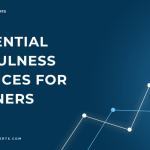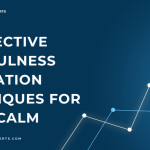“Mindfulness is a way of befriending ourselves and our experience.” – Jon Kabat-Zinn
1. Enhanced Emotional Well-being
One of the most significant benefits of mindfulness is its ability to enhance emotional well-being. Regular mindfulness practice can lead to reduced symptoms of anxiety and depression. A 2024 study published in the journal JAMA Internal Medicine indicates that mindfulness meditation can help alleviate anxiety and depressive symptoms and improve mood.
How It Works:
Mindfulness encourages you to observe your thoughts and feelings without judgment, allowing you to process emotions more effectively. This can lead to a healthier relationship with your emotions, reducing the likelihood of emotional outbursts and fostering a stable mood. For techniques to boost your mental health further, explore 10 Positive Thinking Techniques to Reduce Stress.
“The mind is like water. When it’s turbulent, it’s difficult to see. When it’s calm, everything becomes clear.” – Prasad Mahes
2. Improved Focus and Concentration
In a world filled with distractions, maintaining focus can be a challenge. Mindfulness training has been shown to improve attention span and concentration. Research from the University of California, Santa Barbara found that participants who practiced mindfulness were better at focusing and had improved cognitive flexibility.
Why It Matters:
Improved focus can lead to better performance at work or school, allowing you to accomplish tasks more efficiently. By training your mind to stay present, you’ll find it easier to concentrate on the task at hand. To cultivate a positive mindset that supports focus, check out 10 Powerful Techniques to Cultivate Positive Mindset.
“You can’t stop the waves, but you can learn to surf.” – Jon Kabat-Zinn
3. Better Stress Management
Mindfulness can be a powerful tool for managing stress. By practicing mindfulness, you can learn to respond to stressors with a calm and rational mindset rather than reacting impulsively. The American Psychological Association highlights that mindfulness can help reduce stress levels and improve coping mechanisms.
Mindfulness Techniques:
- Breathing Exercises: Focus on your breath to anchor your thoughts.
- Body Scan: Pay attention to physical sensations in each part of your body.
For additional stress management techniques, see 10 Proven Stress Management Techniques for Daily Relief.
“Stress is not what happens to us. It’s our response to what happens. And response is something we can choose.” – Viktor E. Frankl
4. Greater Self-awareness
Mindfulness fosters greater self-awareness, allowing you to understand your thoughts, emotions, and behaviors better. This increased awareness can lead to personal growth and improved decision-making. A study in the journal Personality and Individual Differences shows that mindfulness can positively influence self-perception.
Benefits of Self-awareness:
- Better decision-making
- Improved emotional regulation
- Clearer understanding of personal values
To explore self-improvement techniques, consider 10 Tips to Overcome Negative Thought Patterns Today.
“Awareness is the greatest agent for change.” – Eckhart Tolle
5. Boosted Creativity
Mindfulness can also enhance creativity. By quieting the mind and allowing thoughts to flow freely, you open yourself up to new ideas and perspectives. Research from Harvard University suggests that mindfulness can lead to more innovative thinking by reducing mental clutter.
Creative Practices:
- Mindful Journaling: Write without judgment to encourage free thought.
- Nature Walks: Spend time in nature to stimulate creative ideas.
For further insights on nurturing your creative side, look at 10 Positive Thinking Exercises to Boost Mental Health.
“Creativity is intelligence having fun.” – Albert Einstein
6. Improved Relationships
Practicing mindfulness can significantly improve your relationships. By being present and attentive, you become a better listener and communicator. The Journal of Marital and Family Therapy reports that mindfulness can enhance relationship satisfaction and reduce conflict.
Key Takeaways:
- Cultivating empathy
- Enhancing communication skills
- Reducing emotional reactivity
To strengthen your relationships further, check out 10 Ways Positive Thinking Transforms Your Relationships.
“The quality of your life is determined by the quality of your relationships.” – Tony Robbins
7. Better Physical Health
Mindfulness isn’t just beneficial for your mind; it can also improve your physical health. Studies have shown that mindfulness can lower blood pressure, improve sleep quality, and boost the immune system. The Mayo Clinic emphasizes the positive effects of mindfulness on overall health.
Health Benefits:
- Lower risk of chronic diseases
- Improved sleep patterns
- Enhanced immune function
To explore how positive thinking can impact physical health, refer to 10 Ways Positive Thinking Boosts Physical Health.
“Take care to get what you like or you will be forced to like what you get.” – George Bernard Shaw
8. Enhanced Resilience
Mindfulness can help build resilience, allowing you to bounce back from adversity more effectively. By teaching you to stay grounded in the present, mindfulness helps you navigate life’s challenges with greater ease. Research from the University of Massachusetts illustrates that mindfulness practices can bolster emotional resilience.
Ways to Build Resilience:
- Regular Mindfulness Practice: Make mindfulness a daily habit.
- Positive Affirmations: Reframe negative thoughts into positive ones.
For additional strategies on resilience, check out 10 Ways Positive Thinking Boosts Resilience in Tough Times.
“Resilience is not about never falling, but about rising every time we fall.” – Nelson Mandela
9. Increased Empathy
Practicing mindfulness can lead to a greater sense of empathy towards others. By fostering a non-judgmental attitude and promoting emotional awareness, mindfulness helps you connect with others on a deeper level. A study in Social Cognitive and Affective Neuroscience shows that mindfulness enhances empathic responses.
Empathy Building Exercises:
- Loving-kindness meditation: Focus on sending positive thoughts to others.
- Active Listening: Engage fully in conversations without distractions.
For more on enhancing emotional intelligence, which ties closely to empathy, see 7 Ways Empathy Boosts Your Emotional Intelligence Today.
“Empathy is about finding echoes of another person in yourself.” – Mohsin Hamid
10. Greater Life Satisfaction
Ultimately, mindfulness contributes to greater life satisfaction. By being present and appreciating the moment, you can cultivate a more fulfilling life. Research from the University of California, Berkeley indicates that mindfulness practice can lead to increased happiness and contentment.
Tips for Enhancing Life Satisfaction:
- Gratitude Journaling: Write down things you’re thankful for.
- Mindful Eating: Enjoy each meal without distractions.
For further practices that enhance positive thinking and life satisfaction, refer to 10 Simple Gratitude Practices to Boost Positive Thinking.
“Happiness is not something ready-made. It comes from your own actions.” – Dalai Lama
Conclusion
The benefits of mindfulness are numerous and far-reaching, affecting not just your mental health but your physical well-being and relationships as well. By incorporating mindfulness into your daily routine, you can experience these surprising advantages and lead a more balanced, fulfilling life.
FAQs
Q: How can I start practicing mindfulness?
A: Begin with short sessions, focusing on your breath for a few minutes each day. Gradually increase the duration as you become more comfortable.
Q: Do I need to meditate to be mindful?
A: While meditation is a common practice, mindfulness can be incorporated into everyday activities, such as eating, walking, or even washing dishes.
Q: Can mindfulness help with chronic pain?
A: Yes, studies have shown that mindfulness can be effective in managing chronic pain by helping individuals change their relationship with pain.
For more information on mindfulness practices, check out resources from Mindful.org or The Greater Good Science Center.
“By embracing mindfulness, you not only enhance your well-being but also enrich your life experiences, leading to a more joyful existence.”





